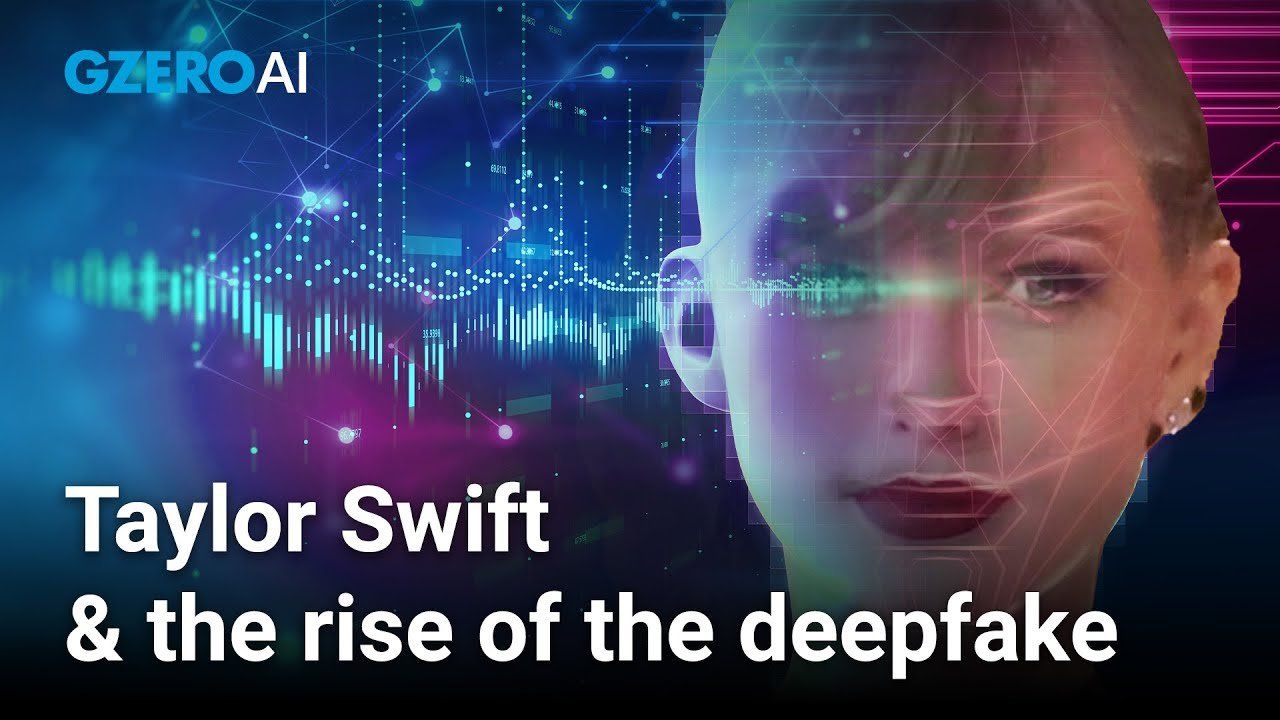GZERO AI Video
Taylor Swift AI images & the rise of the deepfakes problem

Taylor Swift deepfakes: AI-created & AI-promoted | GZERO AI

In this episode of GZERO AI, Taylor Owen, professor at the Max Bell School of Public Policy at McGill University and director of its Centre for Media, Technology & Democracy, examines how Taylor Swift's plight with AI deepfake porn sheds light on the complexities of the information ecosystem in the biggest election year ever, which includes the US elections.
Okay, so full disclosure, I don't love the NFL and my ten-year-old son is more into Ed Sheeran than Taylor Swift, so she hasn't yet flooded our household. However, when one of the most famous people in the world is caught in a deepfake porn attack driven by a right-wing conspiracy theory, forcing one of the largest platforms in the world to shut down all Taylor Swift-related content, well, now you have my attention. But what are we to make of all this?
First thing I think is it shows how crazy this US election cycle is going to be. The combination of new AI capabilities, unregulated platforms, a flood of opaque super PAC money, and a candidate who's perfectly willing to fuel conspiracy theories means the information ecosystem this year is going to be a mess.
Second, however, I think we're starting to see some of the policy levers that could be pulled to address this problem. The Defiance Act, tabled in the Senate last week, gives victims of deepfakes the right to sue the people who created them. The Preventing Deepfakes of Intimate Images Act, stuck in the House currently, goes a step further and puts criminal liability on the people who create deepfakes.
Third, though, I think this shows how we need to regulate platforms, not just the AI that creates the deepfakes, because the main problem with this content is not the ability to create them, we've had that for a long time. It's the ability to disseminate them broadly to a large number of people. That's where the real harm lies. For example, one of these Taylor Swift videos was viewed 45 million times and stayed up for 17 hours before it was removed by Twitter. And the #TaylorSwiftAI was boosted as a trending topic by Twitter, meaning it was algorithmically amplified, not just posted and disseminated by users. So what I think we might start seeing here is a slightly more nuanced conversation about the liability protection that we give to platforms. This might mean that they are now liable for content that is either algorithmically amplified or potentially content that is created by AI.
All that said, I would not hold my breath for the US to do anything here. And probably, for the content regulations we may need, we're going to need to look to Europe, to the UK, to Australia, and this year to Canada.
So what should we actually be watching for? Well, one thing I would look for is how the platforms themselves are going to respond to what is both now an unavoidable problem, and one that has certainly gotten the attention of advertisers. When Elon Musk took over Twitter, he decimated their content moderation team. But Twitter's now announced that they're going to start rehiring one. And you better believe they're doing this not because of the threat of the US Senate but because of the threat of their biggest advertisers. Advertisers do not want their content but put aside politically motivated, deepfake pornography of incredibly popular people. So that's what I'd be watching for here. How are the platforms themselves going to respond to what is a very clear problem, in part as a function of how they've designed their platforms and their companies?
I'm Taylor Owen, and thanks for watching.
Ian Bremmer sits down with former US Ambassador to NATO Ivo Daalder to unpack a historic shift in the transatlantic alliance: Europe is preparing to defend itself without its American safety net.
Think you know what's going on around the world? Here's your chance to prove it.
Argentina, Armenia, Belarus, Egypt, Indonesia, Jordan, Pakistan, Paraguay, Vietnam – to name only a few.
A poster featuring Andrew Mountbatten-Windsor, formerly known as Prince Andrew, is installed on a sign leading to the parking area of the Sandringham Estate in Wolferton, as pressure builds on him to give evidence after the U.S. Justice Department released more records tied to the late financier and convicted sex offender Jeffrey Epstein, in Norfolk, Britain, February 5, 2026.
British police arrested former Prince Andrew Mountbatten-Windsor today over allegations that in 2010, when he was a UK trade envoy, he shared confidential government documents with convicted sex offender Jeffrey Epstein.